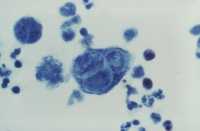Author Interviews, Herpes Viruses, Science, University of Pennsylvania, Vaccine Studies / 23.09.2019
Penn Researchers Developing Vaccine To Prevent Genital Herpes Infection
MedicalResearch.com Interview with:
Harvey M. Friedman, MD
Professor of Medicine/Infectious Diseases
University of Pennsylvania
Philadelphia, PA 19104-6073
MedicalResearch.com: What is the background for this study?
Response: Mice and guinea pigs are the animal models used to evaluate candidate vaccines for preventing genital herpes. My lab has been working on such a vaccine.
Our candidate vaccine contains 3 immunogens. One immunogen is a protein on the virus that is required for the virus to enter cells (viruses need to enter cells to replicate). The other two immunogens are proteins on the virus that help the virus escape immune attack.
Our intent is to produce antibodies to these 3 proteins by immunization and that the antibodies will bind to the proteins on the virus and block the protein functions. The virus then will not be able to enter cells and will not be able to use its evasion strategies to avoid the immune responses generated by the vaccine. Our vaccine aimed at preventing immune evasion is novel as a component of a genital herpes vaccine. (more…)


